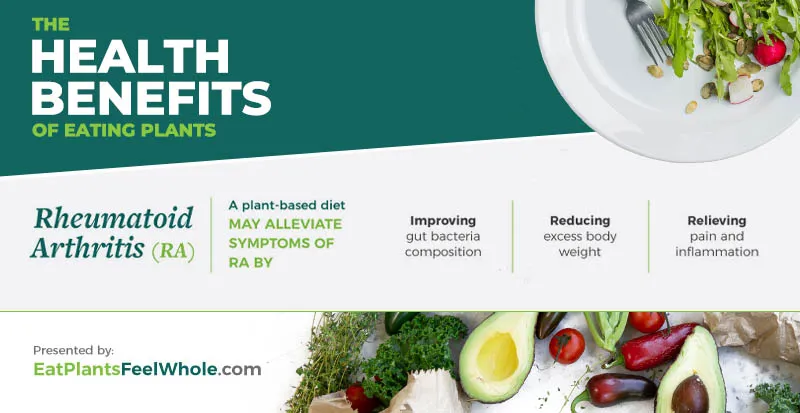- AdventHealth

Here’s some plant-based food for thought: A vegan named Patrik Baboumian, who once broke the record for the heaviest load ever carried, was asked, “How could you get as strong as an ox without eating any meat?” He answered, “Have you ever seen an ox eating meat?”
While most of us don’t plan to break records in a strongman competition, there’s much more at stake when it comes to the health benefits of a plant-based diet: it can help fight disease. That’s why there’s growing support for eating plants as a way to battle health conditions, including rheumatoid arthritis.
What is Rheumatoid Arthritis?
Rheumatoid arthritis (RA) is an autoimmune disease that causes your immune system to attack healthy cells in your body by mistake, leading to painful swelling. Mainly affecting the joints in the hands, wrists and knees, it can cause long-lasting pain, lack of balance and even deformed joints.

Plant-Based Diets and the Power to Fight Inflammation
What researchers are finding is that lifestyle factors, such as diet and activity level, play a role in hurting or helping the body. There are signs that a plant-based diet can reduce inflammation and ease the symptoms of RA.
Inflammation isn’t always bad when it comes to health. It’s actually part of the body’s natural healing system — the immune system. When it’s working the way it was designed to, inflammation helps fight injury and infection. But sometimes it goes awry.
When an unwanted inflammatory response happens, the immune system doesn’t have an illness or injury to fight against. So instead of helping, your own system begins to damage healthy arteries, organs and — in the case of RA — your joints.
The Benefits of Eating Plants to Fight RA
There are several ways a plant-based diet has what it takes to help the body in the battle against RA.
Eating Plants Helps Lower Inflammation
Diets high in fat and processed meat play a role in causing inflammation. One reason is because they raise the level of an unwanted protein called C-reactive protein (CRP). Plant-based diets don’t increase CRP levels.
But don’t discount protein from your diet. Protein builds, maintains and repairs cells, tissues and organs in your whole body. You need it for energy and to support your mind and mood. But protein can be found in more than just meat. Healthy, plant-based sources of protein include:
-
Black beans
-
Kidney beans, lentils and garbanzo beans
-
Nuts and seeds such as almonds, peanuts, walnuts and sunflower seeds
-
Pinto beans
-
Soy protein foods such as tofu, tempeh and seitan
Eating Plants Helps Reduce RA Pain and Swelling
A study was performed with people who have various forms of RA, from moderate to severe. After four weeks of eating a vegan diet, they saw major improvements. Because plant-based foods are usually lower in fat and high in fiber, researchers believe eating plants eased the inflammation, pain and swelling.
Along with helping to calm inflammation, fiber is a super-nutrient that helps lower cholesterol and blood sugar levels, improves healthy gut bacteria and aids weight loss. Add these fiber all-stars to your plant-based diet to help with inflammation.
-
Almonds
-
Apples
-
Bananas
-
Broccoli
-
Brown rice
-
Carrots
-
Kidney beans
-
Lentils
-
Navy beans
-
Oranges
-
Raspberries
-
Rolled oats
-
Spinach
-
Sweet potatoes
-
Wheat
Eating Plants Can Help You Lose Weight
Research shows that extra body weight raises the risk for RA and may keep RA from going into remission if it’s already present. Studies suggest that RA patients who lose more than two pounds of body weight are three times more likely to see improvement in RA symptoms than those who lost less than two pounds.
If you think a plant-based diet can help with weight loss, but you’re not sure just where to start, then simply start small. It can end up making a big difference. Small changes with big impact can happen when you:
-
Choose brown rice instead of white rice
-
Eat whole fruit instead of drinking fruit juice
-
Have a salad to start a meal
-
Snack on popcorn instead of pretzels
It only takes a few changes like these each week. Then, before you know it, you’ll be eating a plant-based diet and seeing positive results on the scale.
Eating Plants Helps Promote a Healthy Gut
The gut biome may play a key part in RA and inflammation. Think of the gut biome as the place where bacteria live. The goal is to have mostly good bacteria living there because the gut biome has a vital role in how your immune system functions.
Eating highly refined, low-fiber foods causes the bacteria in our intestines to change for the worst. That’s because a low-fiber diet tends to grow bacteria in the gut that cause problems, and there’s not enough of the good bacteria. Sticking with a high-fiber, plant-based diet can help the body in its fight against inflammation.
Plants Are Your Immune System’s Friend
Whether you start slow or go all-in on a plant-based diet, it’s best to talk about it with your doctor. This is especially important if you take medication for RA.
What research has made clearer is that eating plants helps fight RA. And that offers hope for the future. More research is needed, but the evidence suggests a menu change can lead to less RA joint pain and swelling and reduce other painful symptoms of the disease.
Learn more about how a plant-based diet can support your whole health.


